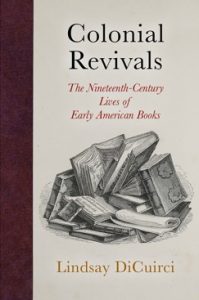
Areas of Interest:
Contact Information
Email: dicuirci@umbc.edu
Office: PAHB 406
Office Number: 410-455-2585
Education
Ph.D., Ohio State University
Biography
She is the current director of the English Honors program at UMBC and the director of the Dresher Center for the Humanities’ Humanities Teaching Labs. Dr. DiCuirci is also an elected member of the American Antiquarian Society, one of the nation’s oldest learned societies and independent research libraries.
Book
Colonial Revivals: The Nineteenth-Century Lives of Early American Books
University of Pennsylvania Press, 2018

In the long nineteenth century, the specter of lost manuscripts loomed in the imagination of antiquarians, historians, and writers. Whether by war, fire, neglect, or the ravages of time itself, the colonial history of the United States was perceived as a vanishing record, its archive a hoard of materially unsound, temporally fragmented, politically fraught, and endangered documents.
Colonial Revivals traces the labors of a nineteenth-century cultural network of antiquarians, bibliophiles, amateur historians, and writers as they dug through the nation’s attics and private libraries to assemble early American archives. The collection of colonial materials they thought themselves to be rescuing from oblivion were often reprinted to stave off future loss and shore up a sense of national permanence. Yet this archive proved as disorderly and incongruous as the collection of young states themselves. Instead of revealing a shared origin story, historical reprints testified to the inveterate regional, racial, doctrinal, and political fault lines in the American historical landscape.
Even as old books embodied a receding past, historical reprints reflected the antebellum period’s most pressing ideological crises, from religious schisms to sectionalism to territorial expansion. Organized around four colonial regional cultures that loomed large in nineteenth-century literary history—Puritan New England, Cavalier Virginia, Quaker Pennsylvania, and the Spanish Caribbean—Colonial Revivals examines the reprinted works that enshrined these historical narratives in American archives and minds for decades to come. Revived through reprinting, the obscure texts of colonial history became new again, deployed as harbingers, models, reminders, and warnings to a nineteenth-century readership increasingly fixated on the uncertain future of the nation and its material past.